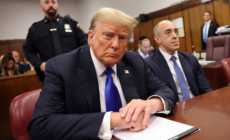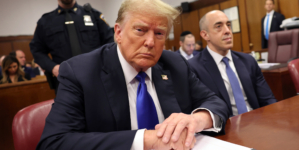-
Eric Adams Suggests the Biden Pardon Proves He Was Also Targeted - 9 mins ago
-
Donald Trump Pardon Supported by Top Democrat - 25 mins ago
-
How Bangladesh’s Economy Was Siphoned Dry - 54 mins ago
-
Mariners Linked To Trade For Phillies’ Projected $142 Million Alec Bohm - 60 mins ago
-
‘Wordle’ Today #1,264 Clues, Hints and Answer for Wednesday, December 4 - 2 hours ago
-
For Some Koreans, Martial Law Stirs Harrowing Memories of Gwangju Uprising - 2 hours ago
-
NYT ‘Connections’ December 4: Hints and Answers for Game #542 - 2 hours ago
-
California Democrat Flips Seat in the Last House Race to Be Decided - 2 hours ago
-
Pete Hegseth ‘Biggest Casualty’ in Trump, DOJ Agreement: Legal Analyst - 3 hours ago
-
Antidoping Agency Froze Out Investigators Who Warned About China - 3 hours ago
Syrian insurgents capture four towns, push toward Hama
Syrian insurgents seized four towns early Tuesday in a significant push toward the central city of Hama, opposition activists reported, intensifying the ongoing battle between President Bashar al-Assad’s forces and a coalition of rebel groups.
The latest advance brings insurgents, led by the rebel group Hayat Tahrir al-Sham and Turkey-backed opposition fighters, within 6 miles of Hama, Syria’s fourth-largest city.
The towns—Halfaya, Taybat al-Imam, Maardis, and Soran—were captured as part of a broader offensive that has seen considerable territorial gains in recent days, including the partial capture of Aleppo, Syria’s largest city, and key towns in the northwest’s Idlib province.

Omar Albam/AP
Why Has Fighting Resumed in Northwestern Syria?
According to the insurgents’ military operations administration, at least 50 government soldiers were killed during the fighting.
The Britain-based Syrian Observatory for Human Rights confirmed the towns’ capture.
In response, pro-government outlets, including Dama Post, reported heavy clashes and Syrian artillery shelling aimed at insurgent positions in and around the newly captured towns.
Syrian state media also highlighted intense airstrikes by both Syrian and Russian forces targeting rebel strongholds in the region.
Despite the insurgent gains, Syrian government forces successfully retook the village of Khanaser on Tuesday, a vital crossroads connecting Aleppo with the rest of the country.

Omar Albam/AP
Which Rebel Groups are Fighting Syrian Forces?
The village had been lost to the opposition in recent days, highlighting the fluidity of the front lines as both sides vie for control.
The long-running civil war, now in its 13th year, continues to claim tens of thousands of lives, with estimates putting the total death toll at around half a million.
The conflict pits Assad’s forces, backed by Russia and Iran, against a complex array of rebel groups, ranging from moderate opposition factions to jihadist militants.
Meanwhile, to the east, the Kurdish-led Syrian Democratic Forces (SDF), which receives U.S. backing, claimed to have captured seven villages from pro-government forces.
However, Syrian state media denied the reports, stating that the SDF’s assault had been repelled.
These villages lie near a U.S. military base close to the Iraqi border, an area of significant geopolitical interest.
What is Turkey’s Involvement in Syria?
On the diplomatic front, Turkey’s Foreign Minister Hakan Fidan suggested that the insurgents’ recent successes underscore the need for Syrian President Assad to engage in dialogue with opposition forces.
He said: “It’s clear that Assad must reconcile with his people.”
However, the Syrian government has refused to negotiate with what it labels as terrorist groups.
Assad has long rejected political solutions with opposition factions and has insisted on the withdrawal of Turkish military forces from northern Syria as a precondition for any potential normalization of ties with Ankara.
For Turkey, a key backer of rebel groups, the conflict is also about managing security concerns along its southern border, particularly from Kurdish militants.
Ankara also faces the complex challenge of ensuring the return of more than 3 million Syrian refugees who fled the violence.
As the war grinds on with no clear resolution in sight, the international community continues to grapple with how to address Syria’s evolving conflict, which has spilled beyond the country’s borders and into the broader regional and global landscape.
This article contains additional reporting from The Associated Press.
Source link



















